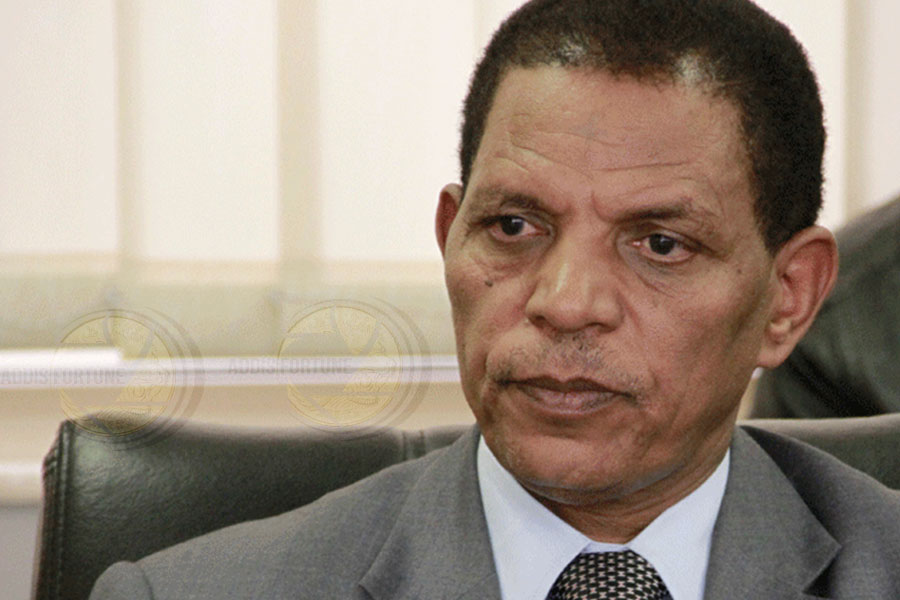
After a year-long court battle, the Regional Supreme Court sentenced Bereket Simon, former board chair, and Tadesse Kassa, a former executive of Tiret Corporate, to six and eight years in prison, respectively, after they were convicted on charges of corruption.
During the final court session held on Friday, the judges also fined the convicts 10,000 Br and 15,000 Br while sentencing them for crimes committed while they were serving at Tiret. Both were arrested in January 2019 in the capital and charged four months later, along with Daniel Gizaw, CEO of dVentus Technologies, on four counts.
Daniel was acquitted of the charges during the session that was held last Monday. He was exonerated from the third count of the charge, which was also dropped for Tadesse and Bereket.
Under the first count, Tadesse and Bereket were charged in connection with share transfers of Dashen Brewery to foreign firms Duet and Vasari. They were accused of selling shares of the company to Duet, while Dashen had other options to raise capital. They were also accused of allegedly selling shares of the company without carrying out due diligence and asset valuation.
The prosecutors of the Amhara Regional State alleged that they sold half of the company's shares in 2012 for 90 million dollars, which is far lower than Meta Abo Breweries' sale value of 225 million dollars. The charge claims that the government sold Meta Abo, which has less production capacity, demand and technology than Dashen, for a higher value.
The prosecutors also asserted that a total of 106 million dollars, including the premium and a joint budget for expansion, was not transferred into Tiret's account. Both of them were also accused of allegedly making Dashen cover the 63,500-dollar expense for the investment and environmental impact assessment, which should have been covered by Duet.
Under the second count, the two men, who were also board members of dVentus Wind Technologies Plc, were charged with causing 210 million Br worth of damages to Tiret. The prosecutors alleged they agreed to and signed an investment agreement with dVentus for the establishment of wind power plants and a smart electric metre without conducting an environmental impact assessment or due diligence or getting approval from the board of directors.
For the investment, Tiret contributed 158.5 million Br in cash and leased land worth 24 million Br, according to the prosecutors. The charge also accused Tadesse of allowing 48.4 million Br to be transferred into a dVentus account without proper documentation. They were charged with leading Tiret to lose 26.8 million Br in the form of expenses for building and office maintenance as well as factory rent.
In the third count, the three of them, including Daniel, were charged with making Tiret liable for 46.6 million Br and other loans that dVentus took before Tiret became a shareholder in the company.
In the last count, Tadesse and Bereket were accused of allegedly making Tiret give 247 million Br in corporate guarantees to dVentus. The charge also claimed that the defendants made Tiret give 27 million Br in guarantees for LA Palma Plc, which later went bankrupt, leading Tiret to pay back 17 million Br of the company's debt. By doing so, the defendants let Tiret lose 102.6 million Br, according to the charge.
The judges, who have been reviewing the case for the past year, announced a guilty verdict on Monday and convicted Tadesse and Bereket for three and two counts, respectively. The judges also adjourned the case for Wednesday to receive sentence aggravating and mitigating factors from both sides.
During Wednesday's session, the prosecutors submitted aggravating factors, stating that the convicts intentionally committed the crimes and committed a series of offences. As sentence mitigation factors, their defence lawyer, Hiwot Lilay, mentioned that her clients have been serving the country for years, have families to care for, are in critical health and have no prior criminal records. Listing these factors, she asked that their sentences be reduced.
The judges sentenced Tadesse to eight years of prison and ordered him to pay a 15,000 Br fine. He was convicted for violating the anti-corruption proclamation for abusing his power. Bereket was convicted on two counts, sentenced to six years of prison, and ordered to pay a 10,000 Br fine. He is convicted by an article from the criminal code for mismanaging his power while he was a notary at Tiret.
The ruling is not legitimate and the court did not give probative value for the defence witnesses and evidence while delivering the verdict, according to Hiwot.
“We’ll definitely appeal to the higher court,” said Hiwot, who hopes that the appeal will be reviewed at the federal level. The convicts might be able to follow the proceedings via a live stream. “Even though the federal courts are temporarily closed due to COVID-19, we’ll ask that our case be reviewed."
Netsanet Abera and Asefash Fente, spouses of Tadesse and Bereket, respectively, said they were not expecting a guilty verdict. And even after the judgement, they were expecting lesser punishment.
The defence witnesses and documents, as well as Tadesse and Bereket, claimed that the acts mentioned in the charges were not offences but were the actions that business activity requires, according to Netsanet. She also posits that they committed no crime that would make them legally liable.
Both of them don't deserve this, according to Asefash.
"They spent their entire life serving their country tirelessly," said Asefash. "They have the truth but don't have the money, power or muscle to reverse the verdict."
Geremew Gebretsadik, attorney general of the Amhara Regional State, did not respond to an inquiry from Fortunebefore the paper went to print.
PUBLISHED ON
May 09,2020 [ VOL
21 , NO
1045]

Radar | May 09,2020

Fortune News | Oct 10,2019

Radar | Jan 07,2023

Radar | Nov 14,2020

Radar | Feb 02,2019

Radar | Feb 02,2019

Fortune News | Feb 22,2020

Fortune News | Apr 27,2025

Radar | Oct 31,2020

My Opinion | Jul 20,2024

Dec 22 , 2024 . By TIZITA SHEWAFERAW
Charged with transforming colossal state-owned enterprises into modern and competitiv...

Aug 18 , 2024 . By AKSAH ITALO
Although predictable Yonas Zerihun's job in the ride-hailing service is not immune to...

Jul 28 , 2024 . By TIZITA SHEWAFERAW
Unhabitual, perhaps too many, Samuel Gebreyohannes, 38, used to occasionally enjoy a couple of beers at breakfast. However, he recently swit...

Jul 13 , 2024 . By AKSAH ITALO
Investors who rely on tractors, trucks, and field vehicles for commuting, transporting commodities, and f...

Jun 28 , 2025
Meseret Damtie, the assertive auditor general, has never been shy about naming names...

Jun 21 , 2025
A well-worn adage says, “Budget is not destiny, but it is direction.” Examining t...

Jun 14 , 2025
Yet again, the Horn of Africa is bracing for trouble. A region already frayed by wars...

Jun 7 , 2025
Few promises shine brighter in Addis Abeba than the pledge of a roof for every family...